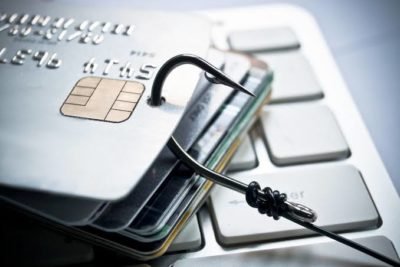The internet is a wonderful world. But like the real world, it is also filled with malice, deceit, and people looking to make a fast buck illegally. These criminals or “Yahoo Boys” as they are commonly called in Nigeria, can run their operations from the safety and anonymity of a keyboard anywhere in the world.


There are thieves out there waiting for you to enter your card information into false or insecure payment forms, they can steal your details. Pray that you don’t fall victim to their schemes. It’s easy to guard yourself against many online scams if you take a few simple precautions, you can help avoid attacks from most scammers and fraudsters.
You should know that thieves can steal your card information from ATMs, Wi-Fi or your phone by using a skimming device or hacking into a merchant’s payment system.
Is It Safe To Shop Online With a Credit/ATM/Debit Card in Nigeria?
Yes, it’s safe to shop online with your card, but it depends on the site where you’re shopping from, as well as the security of both your device and the network you’re connected to.
If you’re using secure e-commerce sites, payment pages have encryptions that prevent anyone even the sites owners from seeing your ATM card number.
When you confirm a purchase, your ATM card information goes through an encrypted channel to a payment processor that handles the transaction. These encryptions made by the payment gateway helps you protect your credit card information from online criminals. Here are a handful of helpful tips to make sure your online card purchases are safe
8 Tips To Help You Stay Safe While Shopping Online In Nigeria
1. Use Credit Cards
The easiest way to keep your payments safe is to always use a credit card. Credit cards come with better consumer protections against fraud and have zero-liability policies, so you’re even better protected.
You can never be 100% sure that your online information is safe, but credit cards are the most secure payment options for online purchases.
Debit cards are not too comprehensive, depending on when you report the card missing, you could be responsible for the entire amount that went missing. It’s also harder to get a refund in case of a debit card fraud.
Debit cards are tools for keeping your costs low spendings and managing your money easily. They don’t have high monthly fees commonly found on credit cards. But credit cards are safer when it comes to online shopping in Nigeria.
If you have doubts about a particular transaction, you should generate an OTP This will make it harder for criminals to steal information, because only the card information was compromised and not the password or physical card itself.
2. Shop only on secure sites
When you purchase a product and you’re about to enter your card information, check and make sure the page’s address starts with “HTTPS://” rather than “HTTP://” before you enter your card or bank details.
The extra ‘s’ in the URL bar indicates that the site uses an encryption system to scramble your card information or transaction. The “s” doesn’t necessarily guarantee the transaction is 100% safe, but it’s a fast and easy way to purchase a product safely in Nigeria.
Your card information is only secure on a network own. For that reason, you should use only private & trusted networks for online shopping in Nigeria. Your home network is the best choice since you can make sure it’s secure. Avoid shopping on your phone/computer unless it’s connected to private Wi-Fi.
3. Don’t shop in public
This is an obvious fact that you should be aware of. Do not conduct online transactions in public places. Some websites, cyber cafes or computers often save login information, allowing your accounts to be open for the next person who uses the computer.
A wifi network without a password has unencrypted data can be visible to any nearby smart device or computer. These devices or other computers may be able to intercept the information you’re sending from websites that don’t have “https” in the URL. This means that you could be sending your ATM card number or other personal information to the waiting hands of an identity thief.
Even if you log out, hackers can install keylogger information to record your keystrokes which allows them to use your usernames, passwords, ATM card numbers, and personal information.
Be sure to log out any websites with your data especially if you’re using a public computer accessible by others. And also disable Autofill. Web browsers often save your card information for you. If you want to remain safe when shopping online, don’t use this feature.
Use your laptop or tablet on a private WiFi connection. If you want to make transactions in public places or Wifi, consider getting a VPN.
4. Never Give Out Your Card Details
You never need to give out your card details and password to anyone just to stay safe. The person may be careless with this detail and leave your card exposed to thieves.
“Phishing” is a common online scam that criminals use to steal from online shoppers. They send emails pretending to be your bank and asking for personal information. If you provide them with your data they would use it to steal money from your bank account.
So, do not share your card details with anyone. To check the legitimacy of this request, contact your financial institution via its published phone number or secure messaging system. You should also not send your card detail via email.
Some hackers specialized in hacking emails and other personal online accounts. Some hackers use search tools that can scan email messages for strings of numbers likely to be credit card accounts. Whenever you give your card number to someone in an unsecured, unencrypted manner (including on a sheet of paper), you increase your risk of exposure.
Do not send a photo of your ATM card to anyone
If you have a good reason for posting a photo of your ATM or debit card, completely blur all the numbers or at the very least, the last 10 digits, which are the unique pin to your account.
If you are talking to your financial transactions on the phone, they require your card number or other personal information to confirm your identity, go to a private place and do not call out the information out loud, anyone in earshot will be able to use it.
5. Keep your anti-virus software up to date
Every computer needs anti-virus software else your computer would be open to attacks and security breaches. Install trusted Antivirus software and update it regularly.
6. Use Strong Passwords
A strong password is important. You should always have a mix of numbers, letters (both uppercase and lowercase characters) and at least one symbol like @,#,$,% or ?.
Don’t use obvious words like your name, school or password. Make your password unique and don’t use the one password for multiple accounts. If a scammer figures out one of your passwords, they have everything.
7. Use Extra security
Some card networks and issuers offer additional protections to their users and online shoppers.
You can sign up for Mastercard Secure Code and be extra safe when you, make a transaction online. Mastercard Secure Code is a security measure that will ask you for a secret 6 digit code when you make a purchase.
You can also use similar programs like Visa Secure and Amex SafeKey, which does not require any registration since they collected your details on sign up.
They protect you behind the scenes while you shop, occasionally asking you to verify in the event of suspicious transactions.
You can also use a trusted payment gateway like PayPal or Apple Pay to provide an additional barrier of security between you and online merchants.
8. Be Alert
If a website looks shady, don’t purchase anything from it. You’re probably safer on websites like Amazon, Jumia, Alibaba, and BestBuy.com. You can usually trust these brands.
A smaller & lesser-known online store should be treated with suspicion especially if the site looks outdated or poorly designed, proceed with caution because stealing your bank details is one thing, and selling fake products is another.
If you ever receive an email with a link to an online store, never shop directly through that link even if it is a big, well-known company like Amazon, Jumia, Alibaba, and BestBuy.com. Instead, navigate to the site directly on your web browser.
If you click on the link, it will direct you to a cloned site that will steal your account details when you’ve ordered a product and enter your card details.
These are the best ways to protect yourself from when shopping online in Nigeria. Debit cards allow you to easily check your account, and debit cards are accepted almost everywhere but credit cards are a better alternative.
But, if you have the chance to use a credit card, it’s probably safer to use a credit card over ATM/Debits cards especially when shopping online in Nigeria.
About The Author


Nwawulu Ebuka is a writer, business consultant, Vlogger, life coach, entreprenuer and student. His articles have appeared in a number of sites, including InformationNgr, 36Naija, Makingmoneyinnigeria and Tadesite reviews. Feel free to reach him on Facbook @Nwawulu Kyz Ebuka.
To submit a post like this on TheNigerianInfo, contact us.